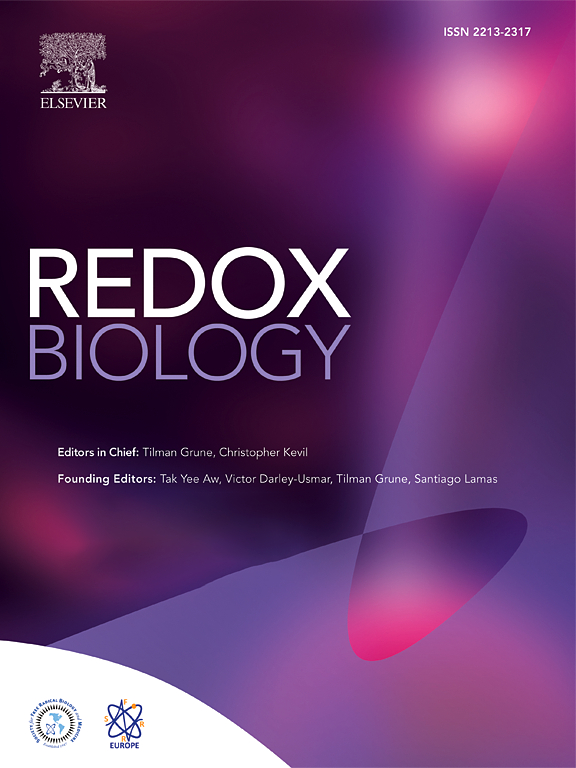Ferroptosis triggers anti-tumor immunity via promoting chaperone-mediated autophagic degradation of SHP2
IF 11.9
1区 生物学
Q1 BIOCHEMISTRY & MOLECULAR BIOLOGY
引用次数: 0
Abstract
Ferroptosis, a form of regulated cell death characterized by iron-dependent lipid peroxidation, plays a significant role in various physiological and pathological processes, including cancer. However, the connection between ferroptosis and anti-tumor immunity remains incompletely understood. Our investigation demonstrates that ferroptosis inducers like RSL3 can enhance the efficacy of anti-PD-1 therapy by activating the STAT1 signaling pathway. Mechanistically, RSL3 activates the tyrosine phosphatase SHP2 in cancer cells and facilitates its degradation through chaperone-mediated autophagy mediated by the KFERQ motif from residues 530 to 534. This enhances cancer cells’ sensitivity to IFN-γ, leading to increased phosphorylation and nuclear translocation of STAT1 and higher expression of major histocompatibility complex class I (MHC I). Consequently, this heightened sensitivity correlates with increased susceptibility to T cell-mediated cytotoxicity. In vivo studies showed that RSL3 treatment reduced SHP2 expression within tumor tissues and bolstered anti-tumor immunotherapy by promoting increased T cell infiltration and function. The combination of RSL3 and anti-PD-1 antibody demonstrates superior therapeutic efficacy in controlling tumor growth compared to monotherapy. Our study not only elucidates a previously unrecognized link between ferroptosis and anti-tumor immunity but also presents a rationale for combining ferroptosis inducers with immune checkpoint inhibitors in cancer treatment.
铁下垂通过促进伴侣蛋白介导的SHP2自噬降解触发抗肿瘤免疫
铁凋亡是一种以铁依赖性脂质过氧化为特征的受调节细胞死亡形式,在包括癌症在内的各种生理和病理过程中起着重要作用。然而,铁下垂与抗肿瘤免疫之间的关系仍不完全清楚。我们的研究表明,像RSL3这样的铁下垂诱导剂可以通过激活STAT1信号通路来增强抗pd -1治疗的疗效。在机制上,RSL3激活癌细胞中的酪氨酸磷酸酶SHP2,并通过伴侣介导的自噬促进其降解,这种自噬由KFERQ基序从残基530到534介导。这增强了癌细胞对IFN-γ的敏感性,导致STAT1磷酸化和核易位增加,主要组织相容性复合体I类(MHC I)的表达增加。因此,这种增强的敏感性与对T细胞介导的细胞毒性的易感性增加相关。体内研究表明,RSL3治疗可降低肿瘤组织内SHP2的表达,并通过促进T细胞浸润和功能增加来增强抗肿瘤免疫治疗。与单药治疗相比,RSL3联合抗pd -1抗体在控制肿瘤生长方面具有更好的治疗效果。我们的研究不仅阐明了先前未被认识到的铁下垂与抗肿瘤免疫之间的联系,而且还提出了将铁下垂诱导剂与免疫检查点抑制剂联合用于癌症治疗的基本原理。
本文章由计算机程序翻译,如有差异,请以英文原文为准。
求助全文
约1分钟内获得全文
求助全文
来源期刊

Redox Biology
BIOCHEMISTRY & MOLECULAR BIOLOGY-
CiteScore
19.90
自引率
3.50%
发文量
318
审稿时长
25 days
期刊介绍:
Redox Biology is the official journal of the Society for Redox Biology and Medicine and the Society for Free Radical Research-Europe. It is also affiliated with the International Society for Free Radical Research (SFRRI). This journal serves as a platform for publishing pioneering research, innovative methods, and comprehensive review articles in the field of redox biology, encompassing both health and disease.
Redox Biology welcomes various forms of contributions, including research articles (short or full communications), methods, mini-reviews, and commentaries. Through its diverse range of published content, Redox Biology aims to foster advancements and insights in the understanding of redox biology and its implications.
 求助内容:
求助内容: 应助结果提醒方式:
应助结果提醒方式:


